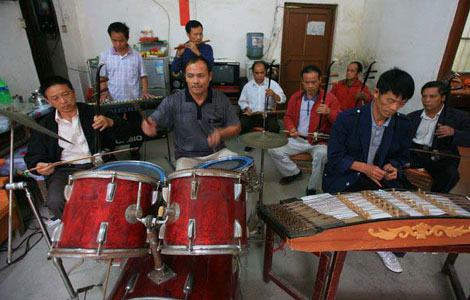Program to promote understanding
Updated: 2011-10-25 15:45
By Zheng Yangpeng (chinadaily.com.cn)
|
|||||||||||
BEIJING - For Nguyen Duc Minh, a 37 year-old Vietnamese diplomat, sparing a month off work to study in China was not easy. But as his China training program came to an end at Beijing Foreign Studies University (BFSU), he realized the time he devoted was worth paying.
"Here I get to know China's mainstream thinking on dealing with foreign relations," he said. "Adding to what I learned in Vietnam, I got a balanced picture."
Nguyen is one of six young diplomats who participated in the second "Understanding China" training program designated for young diplomats from the Association of Southeast Asia Nations, South Korea and Japan. Similar programs have seen steady growth in China, aiming to influence the future policymakers in neighboring countries.
Funded by China's Ministry of Education and organized by the National Research Centre of Overseas Sinology of BFSU, the "Understanding China" program attracted six diplomats as well as six sinologists from seven countries this year, including Vietnam, Laos, Myanmar, Cambodia, Singapore, Malaysia and South Korea.
"We get continued support from the government due to the high quality of our program," Yang Huiling, a director of the program explained. "Our principle is small and selective. That's why we have only twelve trainees this year."
The 27-day program offered courses on China's politics, economics, defense and diplomacy, all lectured by specialist professors. The trainees also visited ancient capitals such as Xi'an, Kaifeng and Luoyang, as well as the Western countryside.
"You go to the countryside, you watch TV, you hang out with students, and you realized how diverse and complicated China is," Lim Shao Li Michelle, a 30 year-old Singaporean diplomat said with excitement. "I never realized there are so many ethnic minorities," she added.
All trainees interviewed conveyed gratitude to the host's hospitality, their understanding of China's diversity, and its breakneck development pace.
Heng Sopphal, a Cambodian diplomat said he had come to China four years ago, but the country changed so much that it was unrecognizable.
Michelle said she was impressed by Chinese people's resilience and entrepreneurialism when she visited some small, innovative Chinese companies.
"What stroke me most were the students at BFSU. I am deeply impressed by their hard-working," Shin Jeoungsoo, a Chinese literature doctorate from Korea University, said at the closing ceremony. "I saw they read foreign languages loudly early morning everywhere in campus, from which I could see the bright future of China."
The gathering of foreign diplomats and scholars was a new feature introduced by the organizer and was not included last year, according to Yang.
"All the invited scholars command Chinese language, but they lack strong voice in the international sphere," explained Yang. "On the other hand, most of the foreign diplomats don't command Chinese and they heavily rely on their countries' press and English media for their China-related report. By mixing them together, the diplomats can get support from the scholars and they can establish contact and cooperate even after they return to their countries."
Another difference, according to Yang, was the enrollment process. The Chinese Foreign Ministry ran the enrollment process last year while the BFSU did it this year. "We want the program to be less official," said Yang.
But Nguyen recommended an official invitation from the government, which would make it easier for leave approval.
"Normally we would send a younger, lower-ranking diplomat to this kind of program," the diplomat with 13 years of working experience said. "But my boss approved my request, which shows the great importance our ministry attaches to Vietnam-China relations."
Overcome misunderstanding
Although the number of training programs for ASEAN countries' officials in China is increasing, organizers said there was an underlying fear and worry among trainees about China's intimidating growth, which was shown in the questions they raised.
"This sentiment can hardly be understood by we who live here. But as an outsider, it is understandable," said Yang. "Some even asked privately whether China is going to launch a war this year."
Mei Renyi, a BFSU professor who has been giving lectures on China's politics at the "Understanding China" program since last year in addition to similar programs around the world, said their doubt and fear is in common with students from other parts of the world.
"They didn't directly raise the suspicion over China's growing might in my class," said Mei. "Instead, they asked a lot of pragmatic questions, such as China's disaster relief system, which are supposed to be answered by the Civil Affairs Ministry."
"But it doesn't mean that they are not worried. Compared to African students' bluntness, they may fear offending the host country," Mei added.
Mei tried to guide them to see whether China's rise is a threat to outside world by providing multiple analytical dimensions. "First you can judge it by the country's behaviors. You can also judge it from the country's historical practice and its cultural tradition," he said.
Mei said he did not expect the course to disperse the concerns in the trainee's minds immediately, but hoped it will broaden their perception of China.
Last year, a Singaporean diplomat wrote in her weekly report that she learned from Mei's class that the genesis of the People's Liberation Army (PLA) was the civil war between the Kuomingtang and the CPC. After the CPC suffered losses due to a weak military force, it built up its own.
"This explains why the PLA, unlike other countries' military force which fall under the control of their government, is an instrument of the Party," she wrote. "This was interesting to me as I had simply attributed this to China's one-party system and have previously never considered the historical context."
Many trainees interviewed said China is much friendlier than what the media back in their countries depicted.
"You tend to be scared when your neighbor is really strong. We had that concern too," South Korean scholar Shin Jeoungsoo said. "Outside China, China looks really scary, but now I'm in China. After talking with professors and laobaixing (ordinary people), I'm more comfortable with China."
Professor Mei would like to see the program become a "long-term investment".
"They are the people who in the future are expected to exert influence over the making of their countries' policy toward China. Every litter misconception and fear we managed to reduce is a big success," he said.
Hot Topics
New sex education textbooks were introduced to pupils in Shanghai on Monday after numerous debates on early-age sex education in China.
Editor's Picks

|

|

|

|

|

|







